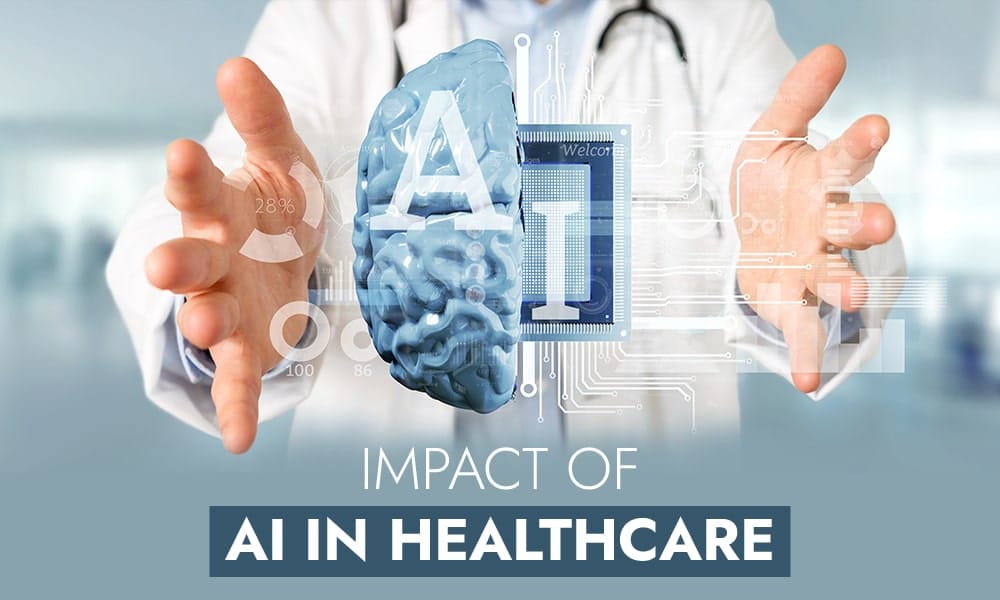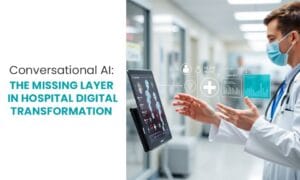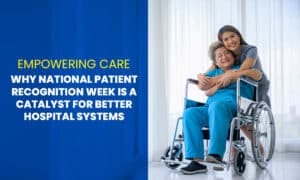
One of the biggest success stories of our time is “Impact of AI in Healthcare“. Medical research has advanced rapidly, increasing life expectancy around the world. However, as longevity rises, healthcare systems face increased demand for their services, rising expenses, and a workforce that is failing to meet the needs of its patients.
Understanding the Basics of Impact of AI in Healthcare
Healthcare spending simply isn’t keeping up. Healthcare systems will struggle to remain viable unless big structural and transformational changes are implemented. Automation, along with artificial intelligence (AI), has the potential to revolutionize healthcare.
Artificial Intelligence in Healthcare is utilized to analyze and avoid illness treatment procedures. AI is employed in many fields of healthcare, including diagnosis, drug research, medication, patient monitoring care centers, and so on.
Ezovion has also created AI algorithms for the healthcare industry to support operational initiatives that reduce costs, improve clinical outcome, and meet staffing and workforce needs.
How is AI Helping to Improve Patient Care ?
AI, which is being heralded as the future of healthcare, has the potential to help expedite routine and basic jobs, decrease redundancies and errors in record management, improve customer happiness, and raise ROI.
This amazing technology provides us with a fantastic potential to revolutionize patient care and satisfaction. Manual job automation in healthcare can be extremely advantageous; it frees up vital time for medical staff to deliver the best possible treatment.
The impact of AI, specifically in healthcare, can be thought of in four ways:
- Relieving Workloads of health care professionals
- Splitting Tasks
- Replacing task with Robotic Process Automation (RPA)
- Complementing your profession and healthcare facility
Impact of AI in Healthcare or AI-Enabled Hospital Management System & How It Can Streamlines Patient Care?
Hospitals that use Hospital Management System and integrate with all the departments in your hospital create massive amounts of medical data. This data must be tapped to obtain deep data intelligence on patient inflow and outflow, clinical data access, data security, inventory and equipment utilization, strategies to address inefficiencies in manual procedures, and so on.
Integrating a Hospital Management System with multiple departments (such as finance, inventory, operations, and administration) and using AI technology would allow healthcare providers to give actual patient care while also allowing the entire network to manage efficiently and cost-effectively.
What a Proper Integration of Artificial Intelligence (AI) Can Potentially impact Patient Care-
Personalized Care-
Patients are individuals, and having a good experience is frequently dependent upon obtaining individualized attention and treatment. Within a busy hospital environment, AI has the capability to analyze specific and tailored clinical outcomes and enhance communication by addressing often neglected aspects such as instructions, educational videos, and goals.
Patient Retention-
Patient retention and subsequent income can improve when patients believe doctors and nurses provide personalized and consistent communication. Impact of AI in healthcare to optimize your follow-up schedule based on diagnosis, age, and personal preferences can greatly enhance your response rate.
Lowering the Burden on Nurses –
Personalized, AI-assisted communication frees up employees to focus on physically presence and care for patients. In addition to assigning tasks for room cleaning and food, patients can also request device chargers and other non-nursing staff needs via programming call buttons. This implies that doctors and nurses may focus on what they do best rather than getting bogged down by small activities and ineffective patient education.
The Benefits of Using AI in Healthcare

Early Diagnosis:
Machine learning algorithms can help to monitor patients’ symptoms and inform clinicians if specific medical conditions arise. This technology is capable of collecting data from medical equipment and detecting more sophisticated ailments.
Personalized Treatment Design
artificial intelligence (AI) models can learn and remember references, which opens the possibility of real-time personalized treatments. Healthcare services might provide patients with 24-hour access to an AI-powered virtual assistant. This system might provide answers depending on the patient’s medical history, preferences, and personal requirements.
Clinical Trial Efficiency:
Technological advancements can help shorten clinical trial times by allowing for a faster search for medical codes linked to patient outcomes.
Accelerate Development:
AI has the potential to help reduce the cost of creating new medications, owing to two considerations. For starters, it can improve drug design and identify viable drug combinations. Furthermore, it has the potential to address many of the difficulties that Big Data poses to the life sciences industry.
Reducing Diagnostic Imaging Errors:
AI is already playing an important role in medical imaging. It can detect early indicators of breast cancer or other illnesses as well as human radiologists.
Organising EHR:
Well trained AI algorithms are effective on a huge quantity of patient data on patient treatment, treatment equipment, respective doctor, and so on, and carefully classified based on the specific patient, illness, treatment for illness, and so on. AI aids in data extraction, predictive analytics, improved clinical documentation, and decision making.
Aids Drug Discovery:
AI could help pharmaceutical companies get drugs to market faster. AI is now able to forecast therapeutic efficacy and adverse effects, as well as to manage the massive amounts of paperwork and data that accompany any pharmaceutical product.
Outbreak Prediction:
AI can give strong tools to automate tasks and assist and educate doctors, epidemiologists, and policymakers on the most effective population and individual health promotion methods. Through AI modelling, health care systems will be able to increase the quality of universal health coverage and respond to emergencies in the future.
Use case of AI in Healthcare:
Medical image analysis
One significant area where AI has shown great promise in healthcare is medical image analysis. The process of analysing and classifying medical images, such as X-rays, CT scans, and MRIs, is traditionally time-consuming and requires significant expertise. However, AI technologies have emerged as valuable tools in optimizing the interpretation of visual information in medical images.
With AI, medical professionals, including cardiologists and radiologists, can benefit from the following advancements in medical image analysis:
- Give all the benefits of an automated system for capturing medical documents.
- Focus on crucial elements in severe instances.
- Aid in making a more accurate diagnosis.
- Reduce the possibility of errors.
- AI-powered medical image analysis systems can process and analyse images rapidly, leading to faster diagnosis and treatment decisions even during emergency situations.
Our solution utilizes AI algorithms to detect multiple health parameters from radiology images, such as fracture types and abnormalities. It assists radiologists, orthopedic surgeons, and clinicians with 100% accurate assessments.
FracID AI Solution by Ezovion:
The FracID AI Solution can be seamlessly integrated with any Radiology Information System (RIS) or Picture Archiving and Communication System (PACS), and it delivers processed and reported assessment outputs within just 10 seconds for each image scan.
Conclusion
AI has immense potential in healthcare, and with adequate investment in research and development, it has the ability to alter the industry in the coming years surely by the impact of ai in healthcare. It is essential to navigate the ethical challenges and ensure responsible implementation to maximize the potential of AI while safeguarding patient privacy and maintaining human oversight in critical decision-making processes. As AI continues to evolve, it promises to revolutionize the future of medicine, paving the way for improved health outcomes and a better quality of life for individuals worldwide.
Looking to improve your healthcare operations with artificial intelligence-powered solutions?
Reach out to us right away to learn more about AI powered products and services.





